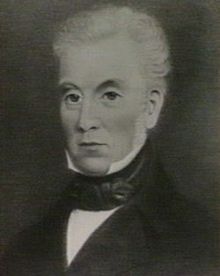William Sorell
| William Sorell | |
|---|---|
 |
|
| 3rd Lieutenant Governor of Van Diemen's Land | |
|
In office 9 March 1817 – 14 May 1824 |
|
| Preceded by | Thomas Davey |
| Succeeded by | George Arthur |
| Personal details | |
| Born | 1775 West Indies |
| Died | 4 June 1848 Marylebone, London, England |
| Spouse(s) | Louisa Matilda Cox |
William Sorell (1775 – 4 June 1848) was a soldier and third Lieutenant-Governor of Van Diemen's Land.
Sorell was born probably in the West Indies, the eldest son of Lieutenant-general William Alexander Sorell and his wife Jane. Sorell joined the British Army in August 1790 as an ensign with the 31st (Huntingdonshire) Regiment of Foot, was promoted lieutenant in August 1793, and saw active service in the West Indies, where he was seriously wounded. Sorell was promoted to captain in 1795. In 1799 he was aide-de-camp to Lieutenant-general Sir James Murray in the abortive expedition to North Holland, and in 1800 took part in the attacks on Spanish naval ports. After the peace at Amiens, Sorell was captain in the 18th or Royal Irish Regiment, and in 1804 was promoted major to the 43rd regiment. In 1807 he was made deputy-adjutant-general of the forces at the Cape of Good Hope, and was promoted brevet lieutenant-colonel. He returned to England in 1811 and on 4 February 1813 retired from the army.
Sorell had married Louisa Matilda, daughter of Lieutenant-General Cox, but had separated from his wife in 1807 before going to South Africa. There he formed a connection with the wife of a Lieutenant Kent serving in one of the regiments, and it is believed that this was the reason for his being retired. On 3 April 1816 Sorell was appointed governor of Tasmania, arrived in Sydney on 10 March 1817 aboard the ship Sir William Bensley, and at Hobart on 8 April 1817. In the meanwhile Lieutenant Kent had brought an action against Sorell "for criminal conversation with the plaintiff's wife", and on 5 July 1817 was awarded £3000 damages.
William Sorell took over from Thomas Davey on the 9 April 1817 with the colony in disarray. He reported that the island was in a 'long disordered state from a Banditti which has subsisted for years'. Punishment for serious offences were difficult due to the vast distances the convict and settler would have to cover in order to get to the court of criminal judicature in Hobart. The police force was also inept, due to it being made up of convicts as the rate of pay it provided was too low for the service of respectable people.
...
Wikipedia
